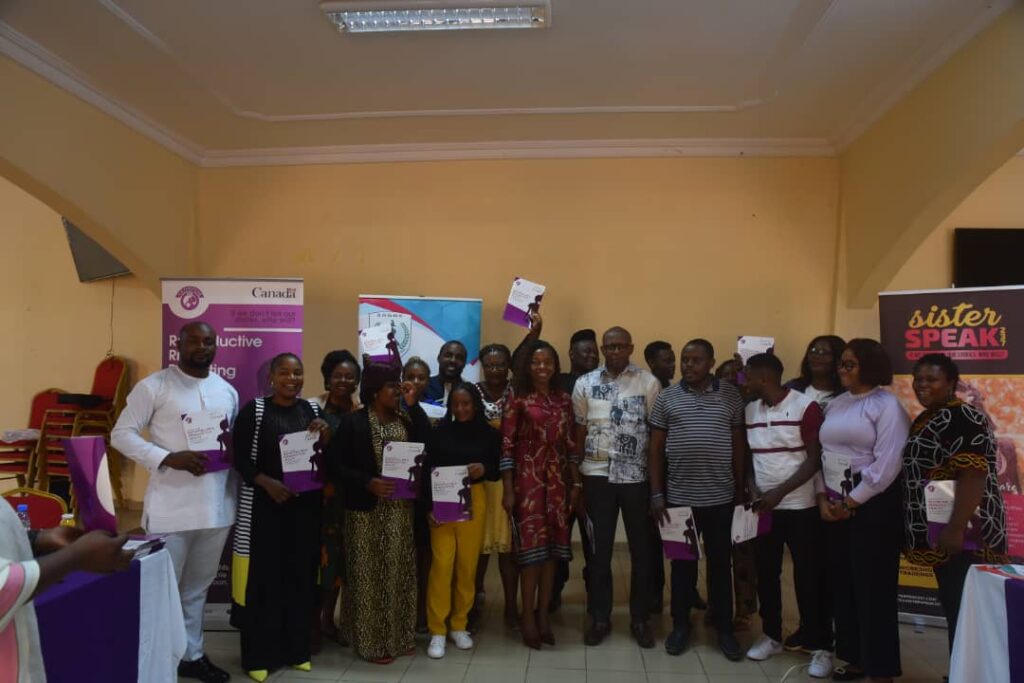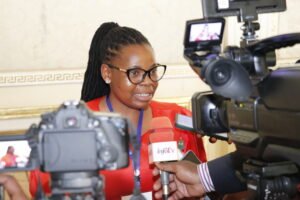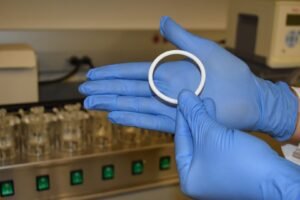The 19 pages manual was officially launched on March 24, 2023, in Yaounde coupled with the closing of the sisterspeak237 reproductive health reporting project for journalists from some six regions in Cameroon.

It is the first ever launched manual on sexual and reproductive health reporting committed for journalists in Cameroon. The 19 pages manual which are both in French and English was officially presented in a ceremony that took place on Friday, 24th March 2023, at the medical council hall of Nkoleton in Yaounde.
The manual is made up of 9 modules that give in-depth knowledge on what is sexual and reproductive health, SRH; facts and figures; policies and legislation in Cameroon; tips for reporting; the type of jargon to be used; how to tackle sensitive topics such as abortion, sourcing information; conclusion and recommendations.

As indicated by SisterSpeak, the manual released is an outcome of a situation diagnosed in Cameroon, that of increasing maternal mortality rate, standing at 406 deaths per 100.000 live births (DHS V,2012-2018).
The ceremony dedicated to the launch of the practical guide was coupled with the closing session of the SisterSpeak237 reproductive health reporting project for journalists from six regions of the country as well as the commissioning of stories on which journalists will report.
This project’s first phase which kicked off on September 28, 2022, with the training workshop of 40 journalists was fully supported by the Canadian Fund for Local Initiatives, CFLI and backed by the contribution of the Society of Gynaecologists in Cameroon, SOGOC, and the International Federation of Gynecology and Obstetrics, FIGO.
In her opening remarks, Comfort Mussa, Coordinator of Sisterspeak237 once more underscored the need to break taboos on sexual reproductive health reporting and normalize conversations around fertility and abortion care.

She said: “the manual will help to report professionally and increase sexual and reproductive health content on local media so that citizens can change their behaviors and make more informed choices about their sex and reproductive health.”
Wanchia Cynthia, project lead at Sisterspeak237 however said the manual produced came as a result of gaps and challenges observed in media reporting.
“One of the main challenges we observed is that of the gap in the media reporting of sex reproductive health and rights issues. Either the media is not doing it effectively or most of the stories have been buried. So, we thought that after engaging with SOGOC and working with them for a very long time, this was our way of wanting to bridge that gap. There are a lot of taboo topics, prejudices, or misconceptions that are been held by the media and even by the society around issues of reproductive health. And our goal here is to change the narrative and equally help improve maternal mortality. Also, let women enjoy their rights to their bodies and take proper decisions that have to do with reproductive health…”

SOGOC’s regional president for the Center chapter, Pr. Felix Esiben while exchanging with media practitioners reassured them of the collaborative and fruitful relationship established for the past months now.
The regional president of the SOGOC, Center chapter praised the project set up by sisterspeak and hoped it will create room for several articles on SRH. He said journalists have a bunch of subjects on which they can focus and write beautiful stories that will interest the public. He stressed on the availability of experts from SOGOC nationwide, in case, they are solicited for their scientific points of view.
He equally pointed out the fact that SOGOC has set the pace for a win-win partnership with the media to advance the advocacy for comprehensive abortion care.

Pr. Esiben Felix also insisted on the fact that, health remains a complex topic that deals with the lives of people and cautioned journalists to treat issues related to health with a lot of precaution, take time to investigate, and avoid to hurt.
Mr. Whumo Blaise, journalism lecturer and one of the key actors who worked on the manual said journalists mostly students should develop the will and interest to report on issues that are less highlighted.

He said: “The first thing I think I will do is to introduce them to health reporting, make them passionate. And then we can bring specialization into SRH reporting. This, therefore, starts by building that passion because anything you are not passionate about you cannot be effective on it. It is a passion that brings you to work hard and become the best. Therefore, the strategy is to make them understand while they have to head into health reporting and they can research stories and write on them…”
The session was equally enriched by best practices from journalists who praised the initiative as it will greatly help to have a grip on health experts and researchers who are not always open to interviews from the fourth estate.

Sisterspeak237 is an organization that amplifies the voices of women and minority groups in Cameroon. The organization that was created in 2014 has so far trained and equipped women with the skills and tools needed to tell their stories and be more visible. Sisterspeak has the mandate to tell underreported stories and facilitate debates and discussions on issues affecting women in Cameroon.
Elise Kenimbeni





